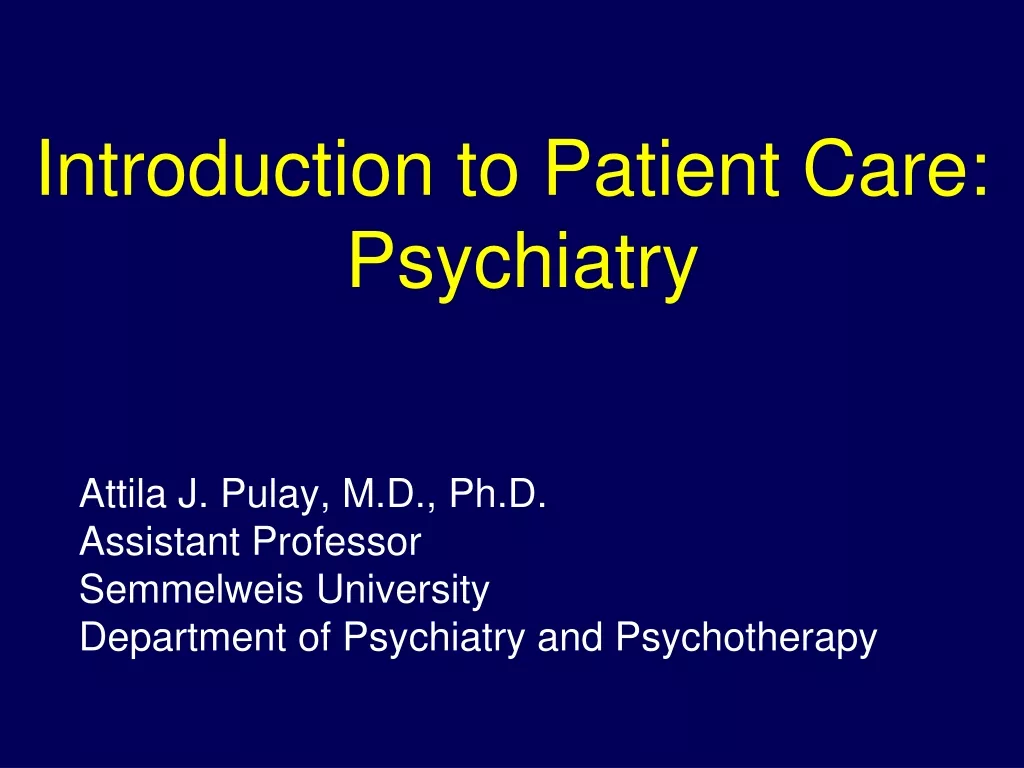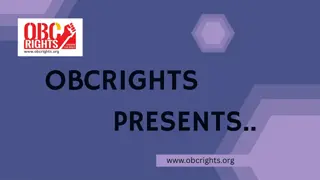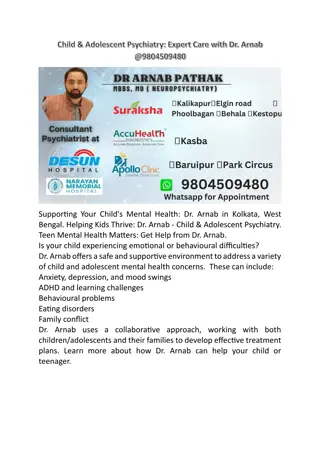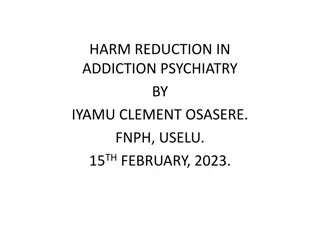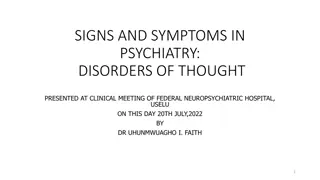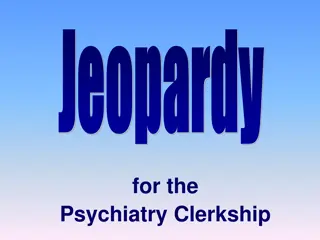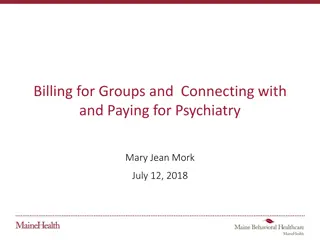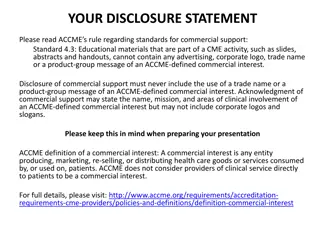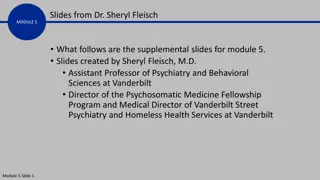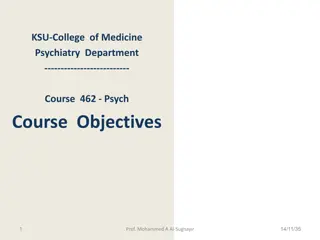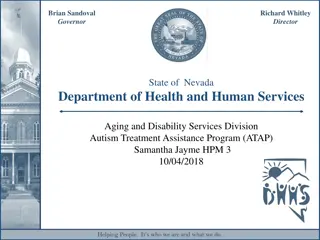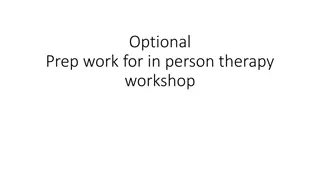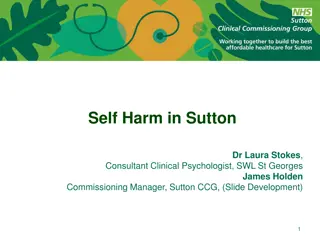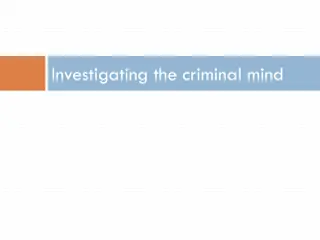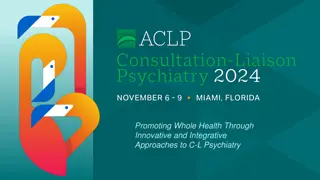Comprehensive Overview of Old Age Psychiatry Services in Sutton
Explore the specialized services offered by the Old Age Psychiatry team in Sutton, including memory assessments, dementia care, multidisciplinary support, challenging behavior interventions, and community outreach. Learn about the dynamic approach to treating elderly individuals with mental health issues in their homes and care facilities.
Download Presentation

Please find below an Image/Link to download the presentation.
The content on the website is provided AS IS for your information and personal use only. It may not be sold, licensed, or shared on other websites without obtaining consent from the author.If you encounter any issues during the download, it is possible that the publisher has removed the file from their server.
You are allowed to download the files provided on this website for personal or commercial use, subject to the condition that they are used lawfully. All files are the property of their respective owners.
The content on the website is provided AS IS for your information and personal use only. It may not be sold, licensed, or shared on other websites without obtaining consent from the author.
E N D
Presentation Transcript
OLD AGE PSYCHIATRY Dr Suhana Ahmed ST5 to Dr Debbie Stinson Sutton Older People s Community Mental Health Team
Agenda What is it What did we do What do we do The team Referrals Memory assessment & f/u Dementia Drugs
Old Age Psychiatry general psychiatry in the elderly population ?definition of elderly Service to all elderly people suffering from organic illness, i.e. dementias of various types or functional illness, i.e. depression, schizophrenia, etc. complexity of cases, i.e. psychiatric conditions modified by physical illness and organic mental changes and the coexistence of organic and functional illness. close working relationship with primary care and other agencies such as social services
What we do now Multidisciplinary team 3 beds for Sutton out of borough (Tolworth) Intensive Home Treatment Challenging behaviour service SS separate service Change in referrals over years younger age, more complex, interface with other specialties.
Intensive Home Treatment Team Inpatient ward staff Community Psychiatric nurses Recovery Support workers Reduction in beds Help treat people in their own homes and keep them out of hospital Can see people up to twice a day Roles: - supervise meds - monitor risk - monitor mental state - support family and client Access only via CMHT
Challenging Behaviour Service Psychologists CPNs Challenging behaviour in context of dementia e.g agitation, violence, not eating and drinking, under or over stimulation Holistic assessment staff, environment, observation Only in care homes at present Work with staff and clients to help manage behaviour Use of psychological measures rather than medication Direct referrals from GPs
Old Age Liaison Team Based at St Helier s OT and CPN Small amount of medical input Due to increase resources in next few months. Assessments for those picked up on screening.
Core Trainee (1) Specialist Trainee (1) Old Age Psychiatry Consultants Specialty doctor Sutton Older People s Community Mental Health Team Clinical Psychologists Community Practice Nurses (4) Recovery Support worker Occupational Therapists
Referrals What? Who? Memory problems Clarify diagnosis Functional e.g. moderate/severe depression Agitated behaviour Capacity MCI/ Worried well GPs Adult Psychiatry Other services e.g social services Early diagnosis CQUIN in acute setting - confusion QOF in GP dementia diagnosis Other specialties neurology, old age A&E Early diagnosis
Referrals Inappropriate referrals Acute confusion Appropriate referrals Chronic cognitive impairment Previous mental illness, nil current Severe mental illness psychosis, depression Multiple simultaneous referrals Purely social care Timely diagnosis Our criteria - age
OPC Memory assessment. Dear colleague, I would be grateful for your review of this 84 year old man. Mr X and her son came to see me at the surgery. His son reports problems with his short term memory. He forgets where he puts keys and cannot recall recent conversations. AMT was 7. Many thanks, GP
OPC Memory assessment Prior to appointment: (GPs to provide) - GP summary med list, medical history - Dementia blood screen - Screen out physical causes e.g delirium or neuro problems - Ideally some cognitive testing History Collateral history Mental State Examination Formal cognitive assessment SMMSE, ACE III Risk
OPC management plan Consider any physical causes and treat Consider effects of physical meds Neuroimaging (if appropriate) ?Further cognitive testing if required F/u apt in 8-10/52 Social input - CCA - OT - Any other services
F/U appointment Further cognitive assessment (if required) Review scan with clinical history (do they correlate?) MCI Discuss diagnosis Treatment medication, cognitive stimulation. Alzheimer s society ?further f/u (mandatory if started on meds)
Have you thought about these services Admiral nurses specialist dementia nurses practical and emotional support to family carers tailored to their individual needs and challenges. Increase in number Alzheimer s society Dementia advisors Carer support Activity groups
Have you thought about these services Carers centre Carers assessment/support Counselling and wellbeing Benefits and advice Support groups/training Age UK Home and care including equipment Money matters Advice and support Social services Community care assessment Safeguarding
Summary Various changes to service including new sub teams IHTT, CBS Reduction in beds Multidisciplinary team Functional and organic Various modes of referral Memory assessment various parts Consider other services
Types Vascular 17% Alzheimer s 62% Lewy body dementia 4% Mixed 10% DEMENTIA Fronto-temporal 2% Other: 3% Parkinson s Dementia 2%
Alzheimers extracellular deposition of beta amyloid-A and intracellular accumulation of tau protein. Proteins build up in the brain to form structures called 'plaques' and 'tangles'. loss of connections between nerve cells death of nerve cells and loss of brain tissue. Shortage of acetylcholine
Alzheimers http://img.webmd.com/dtmcms/live/webmd/consumer_assets/site_images/articles/health_tools/alzheimers_caregivers_slideshow/princ_rm_photo_of_alzheimer_brain.jpg
Alzheimers - symptoms Short term memory Recall Learning new info language visuospatial skills concentrating, planning or organising Orientation Anxiety, irritability, depression Communication Psychotic symptoms Unusual/out of character behaviour agitation, calling out, sleep, aggression Awareness, frailty, eating.
AtypicalAlzheimers earliest symptoms are not memory loss. underlying damage (plaques and tangles) is the same first part of the brain to be affected is not the hippocampus. Posterior cortical atrophy (PCA) Logopenic aphasia Frontal variant Alzheimer's disease left posterior temporal cortex and inferior parietal lobule atrophy of the back (posterior) part of the cerebral cortex frontal lobes primary progressive aphasia planning and decision- making. Visual info/ spatial awareness language socially inappropriate, lack of empathy speech labored with long pauses. e.g identify objects/ reading, uncoordinated, judge distances
Vascular Dementia reduced blood supply to the brain due to diseased blood vessels. Death of brain cells Stroke related Sub cortical Most common Post stroke dementia 20% within 6 months diseases of the very small blood vessels that lie deep in the brain Single-infarct Small Temporary asymptomatic thick walls and become stiff and twisted, meaning that blood flow through them is reduced. small vessel disease Multi-infarct
Vascular dementia most common cognitive symptoms in the early stages problems with planning or organising, making decisions or solving problems difficulties following a series of steps (eg cooking a meal) slower speed of thought problems concentrating, including short periods of sudden confusion. memory- problems recalling recent events (often mild) language- eg speech may become less fluent visuospatial skills - problems perceiving objects in three dimensions. Mood apathy, lability, depression
Vascular dementia subcortical vascular dementia Early loss of bladder control common. mild weakness on one side of their body, or less steady walking and more prone to falls. clumsiness, lack of facial expression and problems pronouncing words.
Vascular dementia Stroke-related dementia progresses in a 'stepped' way long periods when symptoms are stable and periods when symptoms rapidly get worse Subcortical dementia more often symptoms get worse gradually (similar to Alzheimer s course)
Fronto-temporal dementia Frontal behaviour and emotions Temporal understanding of words nerve cells in the frontal and/or temporal lobes of the brain pathways that connect them change the brain tissue in the frontal and temporal lobes shrinks. Younger age group behavioural variant frontotemporal dementia progressive non-fluent aphasia semantic dementia.
Fronto-temporal dementia Behavioural variant frontotemporal dementia two thirds Personality and behaviour lose their inhibitions lose interest in people and things - lose motivation lose sympathy or empathy show repetitive, compulsive or ritualised crave sweet or fatty foods, lose table etiquette, or binge on 'junk' foods, alcohol or cigarettes.
Fronto-temporal dementia Language variants of frontotemporal dementia early symptoms- progressive difficulties with language apparent slowly, often over two or more years. semantic dementia, progressive non-fluent aphasia speech is fluent lose their vocabulary and understanding of what objects are initial problems - speech. slow, hesitant speech asking the meaning of familiar words trouble finding the right word, errors in grammar difficulty recognising familiar people or common objects.
Fronto-temporal dementia Progression - differences between the three types become much less obvious. later stages, damage to the brain becomes more widespread. Symptoms are often then similar to those of the later stages of Alzheimer's disease. 10-20 per cent of people with frontotemporal dementia also develop a motor disorder, before or after the start of dementia. motor neurone disease progressive supranuclear palsy corticobasal degeneration. a person with both conditions will live for two or three years after diagnosis.
Lewy Body dementia symptoms with both Alzheimer's disease and Parkinson's disease under-diagnosed tiny deposits of protein in nerve cells low levels acetylcholine and dopamine loss of connections between nerve cells. progressive death of nerve cells and loss of brain tissue. brain and nervous system
Lewy Body dementia often subtle, but gradually worsen to cause problems with daily living attention and alertness - fluctuate widely over the course of the day, by the hour or even a few minutes. judging distances and perceiving objects planning and organising Visual hallucinations - people or animals, and are experienced as detailed and convincing. Delusions movement problems rigidity, tremor, bradykinesia Sleep disorders
Lewy Body dementia Worsening movement problems mean that walking gets slower and less steady speech and swallowing, leading to chest infections or risk of choking. Eventually, someone with DLB is likely to need extensive nursing care Diagnostic difficulty
Dementia and Drugs Drugs to treat Alzheimer s disease Drugs to treat symptoms associated with dementia Drugs to treat physical disorders in people with dementia
Anti Dementia Drugs Acetylcholinesterase inhibitors Donepezil Galantamine Rivastigmine Memantine
Anti Dementia Drugs Initiation of anti-Alzheimer drugs is usually by a specialist. More follow up in primary care (SLAM). Little to choose between AChEIs. Main side effects are syncope & GI Contraindicated in cardiac conduction problems or if pulse rate <60. Continue even in more severe stages, if tolerated. May cause agitation in advanced dementia.
Monitoring Regularly check by specialist team check-up - assessment of the patient's cognition, behaviour and ability to cope with daily life views of carers discussed at start of drug treatment and at check- ups treatment is continued as long as it is judged to be having a worthwhile effect cholinesterase inhibitor - least expensive of the three drugs is prescribed first. However, if not suitable - another cholinesterase inhibitor could be chosen.
Acetylcholinesterase inhibitors Mechanism of action: Prevent enzyme acetylcholinesterase from breaking down acetylcholine in the brain. Increased concentrations of acetylcholine - increased communication between the nerve cells that use acetylcholine Indications: mild-to-moderate Alzheimer's disease dementia with Lewy bodies and dementia related to Parkinson's disease - rivastigmine (most evidence) Not started in acute setting Effectiveness 40-70 per cent with Alzheimer's disease benefit from cholinesterase inhibitor treatment Not effective for everyone and May improve symptoms only temporarily, between six and 12 months in most cases
Acetylcholinesterase inhibitors Donepezil (Aricept) Rivastigmine (Exelon) Galantamine (Reminyl) capsules or oral solution starting dose 8mg OD 4/52, increased to 16mg OD for another 4/52. Maintenance dose of 16-24mg daily Tends to be first line BD ON. Starting dose 3mg a day in 2 doses, usually increase to 6mg - 12mg a day Starting dose 5mg ON, increased to 10mg OD after 1/12 if necessary. Slow-release capsules (Reminyl XL) are available (once a day). maximum licensed total 10mg OD Patch-two versions. Daily dosages of 4.6mg or 9.5mg. Fewer side- effects than the capsules maximum licensed total daily dose is 24mg.
Memantine (Ebixa) Mechanism of action: NMDA receptor antagonist Blocks glutamate. Glutamate released in excessive amounts when brain cells are damaged by Alzheimer's disease - brain cells damaged further. Protect brain cells by blocking effects of excess glutamate. Indications severe Alzheimer's disease moderate disease who cannot take the cholinesterase inhibitor drugs. Administration Tablets or oral drops recommended starting dose 5mg OD, increasing after 4/52 to up to 20mg OD maximum licensed total daily dose is 20mg
Summary Anticholinesterase inhibitors Donepezil, rivastigmine, galantamine NMDA antagonist Memantine Not indicated for all dementias e.g not indicated for vascular dementia Compliance supervision, prompt Risks: syncope, GI and bradycardia Not tolerated change to another AChEI Regular monitor including cognitive assessment.
Drugs to treat symptoms associated with dementia
Depression and Dementia common psychological conditions that are frequently experienced by people with dementia and their carers particularly common in people who have vascular dementia or Parkinson's dementia Diagnostic difficulty overlap in symptoms between dementia and depression Depression may worsen behavioural symptoms dementia = aggression, problems sleeping or refusal to eat. later stages of dementia, depression tends to show in the form of depressive 'signs - tearfulness and weight loss
Depression and Dementia early stages of dementia- may be linked to a person's worries about their memory and about the future. Chemical changes in the brain, caused by the dementia, may also lead to depression or anxiety. People living in care homes seem to be particularly at risk of depression.
Treatment of depression in dementia Psychological Cognitive Behavioural Therapy helpful for people in the early stages of dementia Less appropriate in the later stages of dementia, communication problems are common. Medications Selective serotonin reuptake inhibitors (first line) Sertraline or citalopram (max 20mg) Mirtazapine (Atypical) sedation and appetite Trazodone (tricyclic antidepressant) sedating S/e mild, GI Caution: Hyponatraemia



